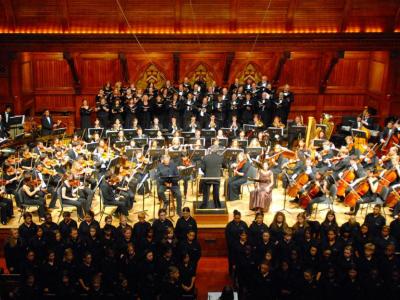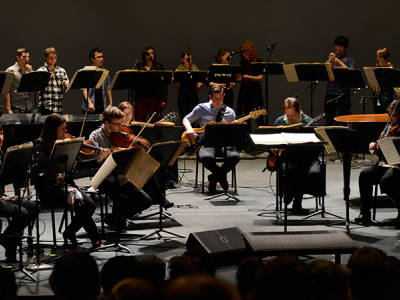What does a Music Director (Church) do?
Church music directors, also called choir directors, are professional bandleaders and administrators hired by churches to lead the choir and develop the church's music-oriented activities. Their job varies based on the structure of the church’s music department and the goals of the minister, but almost always involves scheduling and leading choir rehearsals; conducting and leading the choir in performance; recruiting and auditioning new singers and volunteers; fostering each singer’s musical growth; and appointing senior choir members to become section leaders, soloists, and assistant conductors. Music directors also choose the choir's performance pieces, prepare special programs for holidays or special occasions, and work alongside the church organist (if they don't play organ themselves). Some church choirs are highly competitive, and planning for competitions might also be part of the job.
Excellent interpersonal skills are a must, as are the patience, clarity, and ease of communication necessary to teach well.
Besides leading the choir, the music director has a number of administrative duties, including creating a budget for the music program (which might pay for robes, sheet music, travel, set, and staging), performing administrative work, and maintaining weekly office hours. In addition, music directors might be involved in developing the church's music programs further by leading a small music class at an associated Sunday school, planning local performances and choir showcases, or training a separate church or gospel band (which typically includes instruments like guitar and drums). Finally, music directors connect the church to the broader community of church music by attending conferences and seminars to bring back new pieces, techniques, and literature for development of the music department and singers.
At a Glance
Most church music directors are trained musicians and singers who grew up singing choir music. Some work as church organists or choir singers before finding music director positions. For many, working as a church music director is a part-time music position and is combined with other work or study. Unless they're working in the world of competitive choir music, music directors are unlikely to have many opportunities for direct career advancement. However, gradually building up a church’s music programs can be just as rewarding as climbing a career ladder. Ultimately, church music directors use their job experience to lead school, community, and professional choirs, and many become professional music or voice teachers.
Maintaining relationships with local churches, demonstrating service to communities, and gaining experience working with choirs of different sizes and skill levels go a long way toward preparing for this position.
- Conducting
- Singing and choral techniques
- Organ or piano
- Harmony
- Composition
- Teaching
- Leadership
- Latin
A church music director should be enthusiastic and dedicated, with a positive attitude and a commitment to serving the local community. Excellent interpersonal skills are a must, as are the patience, clarity, and ease of communication necessary to teach well. Although teaching is a large part of the job, so is performance, and church music directors must possess the musicianship to consistently craft strong performances. Years of experience as a church musician or member of the church choir—as well as deep knowledge of choral repertoire and Christian scripture—are essential.
Music directors at large, music-oriented churches may have busy performance schedules, often working with multiple choirs of differing levels. On the other hand, choir directors for small churches may work part-time hours, or a full-time schedule with ample free time to develop new music initiatives. While some music directors are members of the church community and make time outside of work to participate in church and community events, others are relatively secular musicians who enjoy a professional relationship with the church.










